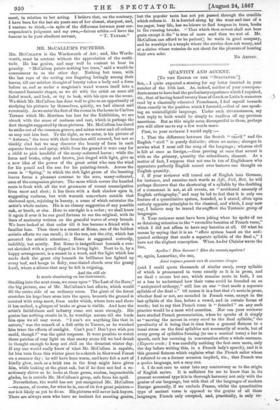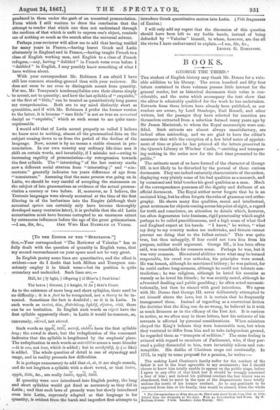QUANTITY AND ACCENT.
[To THE EDITOR OF THE 41 SPECTATOR."
Sin, —I quite expected a stoning for my letter inserted in your number of the 10th inst. As, indeed, neither of your correspon- dents seems to have had the preliminary experience which I required, viz., that of having heard twenty lines of Greek or Latin hexameters read by a classically educated Frenchman, I feel myself towards them exactly in the position which I foretold,—that of one speak- ing an unintelligible language. Under such circumstances, my best reply to both would be simply to reaffirm all my previous assertions. But as this might seem disrespectful to them, perhaps you will allow me to say a few words more.
First, to your reviewer I would reply:- 1. That the difference between the Scotch " " and the English " civil " is purely dialectic ; alters no metre ; changes in nowise what I must call the song of the language ; whereas civil is felt at once as foreign,—thus proving at once that accent is with us the primary, quantity the subordinate, element. As a matter of fact, I suppose that not one in ten of Englishmen who appreciate perfectly English accent ever bestows one thought on English quantity.
2. If your reviewer will travel out of English into German, for instance, and examine such words as Affe, Fall, Bett, he will perhaps discover that the shortening of a syllable by the doubling of a consonant is not, at all events, an " accidental anomaly of English orthography," and may be led to feel that it is only one feature of a quantitative system, founded, as I stated, often upon entirely opposite principles to the classical, and which, I may now say, I believe may be traced throughout the Teutonic group of languages.
3. Your reviewer must have been joking when he spoke of me as detaining attention to the " recondite beauties of French verse," which I did not affirm to have any beauties at all. Of what he means by saying that it is an " effete system based on the anti- quated orthoepy that made a separate syllable of the final e," I have not the slighest conception. When Andre Chenier wrote the line,
Apollon ! Dieu Sauveur ! Dieu des savants.mysteres I or, again, Lamartine, the one, Ainsi toidours pousses vers de nouveaux rivages
(and I could quote thousands of similar ones), every syllable of which is pronounced in verse exactly as it is in prose, and no final e occurs but one, which remains mute in both, I am at a loss to understand how their verse could be founded on an " antiquated orthoepy," still less on one " that made a separate syllable of the final e." Of course it is a fact that e's mute in prose, whether final or not, are sounded in French verse, except in the last syllable of the line, before a vowel, and in certain forms of words; but to say that French verse is " founded " on any such practice would be a most wild assertion. Nor can your reviewer have studied French pronunciation, when he speaks of it simply as " moving the accent in every word to the final syllable," the peculiarity of it being that it rises from a general flatness to a tonal stress on the final syllables not necessarily of words, but of every group of syllables forming (to use a musical term) a bar in speech, such bar covering in conversation often a whole sentence. (Experto crede ; I was carefully noticing the fact once more, only the day before writing this, in a French lady's speech), and it is this general flatness which explains what the French sailor whom I referred to on a former occasion implied, viz., that French Was a spoken language, not a sung one.
4. I do not care to enter into any controversy as to the origin of English metre. It is sufficient for me to know that in its present accentual type it is in thorough harmony not only with the genius of our language, but with that of the languages of modern Europe generally, if we exclude France, whilst the quantitative type of ancient verse is opposed to the genius of all these languages, French only excepted, and, practically, is only re-
produced in them under the garb of an accentual pronunciation. From which I still venture to draw the conclusion that the attempt to render that which one does not understand through the medium of that which is unfit to express one's object, reminds me of nothing so much as the search after the universal solvent.
Perhaps your reviewer will allow me to add that having resided for many years in France,—having learnt Greek and Latin alternately in England and in France,—having taught French to a class of English working men, and English to a class of French refugees,—nay, having " dabbled " in French verse even before I dabbled " in English, I may possibly know something of what I have written about.
With your correspondent Mr. Robinson I am afraid I have still less common standing-ground than with your reviewer. He sloes not seem to me even to distinguish accent from quantity. For me, Mr. Tennyson's hendecasyllables owe their charm simply to accent, not to quantity; and how the last syllable of " exquisite," or the first of "little," can be treated as quantitatively long passes my comprehension. Both are to my mind distinctly short as quantities, and if with Mr. Robinson I prefer the former version to the latter, it is because " rare little" is not so true an accentual dactyl as " exquisite," which as such seems to me quite unex- ceptionable.
I would add that of Latin accent properly so called I believe we know next to nothing, almost all the grammatical data on the subject coming down to us from the period of the decline of the language. Now, accent is by no means a stable element in pro- nunciation. In our own country any ordinary life-time sees it shift on certain words, and invariably, if I mistake not—owing to increasing rapidity of pronunciation—by retrogression towards the first syllable. The " interesting " of the last century marks now a different social stratum from " interesting ;" and " con- centrate" generally indicates ten years difference of age from "concentrate."- Assuming that the same process was going on in Latin, we should be very careful of accepting the statements on the subject of late grammarians as evidence of the actual pronun- ciation a century or two before. If, moreover, as I believe, the Teutonic languages were already accentual at the time of the first filtering in of the barbarians into the Empire (although their accentual system can certainly only have become thoroughly developed many centuries later), it is probable that the old Latin accentuation must have become corrupted to an enormous extent by extraneous bffitiences before the age of the great grammarians.
—I am, Sir, &C., ONE WHO Has DABBLED IN VERSE.































 Previous page
Previous page